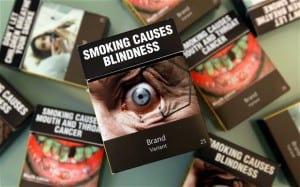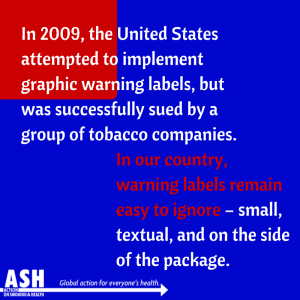Plain Packaging Should be Universal
Yesterday, Ireland became the first country in Europe and the second country in the world to pass legislation requiring plain packaging for tobacco products. Under the new rule, all forms of branding will be banned, including logos and colors. The packages will be covered with graphic warning labels and uniform brand names.
While the president still must sign the law within seven days, his support is expected. The move has been cheered by public health advocates around the world, and jeered by tobacco companies who have promised to sue to prevent or overturn the measure.
There is no doubt that plain packaging saves lives. [1] Australia passed plain packaging in 2011, and with the United Kingdom, France, and Finland also on the verge of taking action, this is the beginning of a positive new trend in the world. It also gives Ireland elite status in the battle against the tobacco epidemic.

More than a decade ago, Ireland began another trend as the first country to ban smoking in all indoor public and work spaces. At the time, critics said that Ireland’s “pub culture” would never accept the ban, but polls show that even smokers in Ireland can’t imagine going back to the way it was.
Today, 43 countries and hundreds of local jurisdictions have complete bans, protecting hundreds of millions of people from involuntary exposure to secondhand smoke. In the next few years, we hope public indoor smoking bans will become the norm everywhere.
Plain packaging is the end result of a path that was started by Canada in 2001, when it implemented the world’s first graphic labels to help warn the public of the dangers of smoking. Since then, 76 jurisdictions have followed suit. [2]
 Four countries – Pakistan, India, Nepal and Thailand – have graphic warnings that cover 85% of the package surface. Graphic warnings are far more effective than textual warnings, especially among poor or illiterate populations. A new country adopts graphic warnings every few months, and soon it will be the norm around the world.
Four countries – Pakistan, India, Nepal and Thailand – have graphic warnings that cover 85% of the package surface. Graphic warnings are far more effective than textual warnings, especially among poor or illiterate populations. A new country adopts graphic warnings every few months, and soon it will be the norm around the world.
Spreading these public health trends worldwide will save hundreds of millions of lives this century, but we face two major obstacles – the tobacco industry, and the politicians they have bought and paid for.
Canada attempted to pass plain packaging in the 1990s, but backed down in the face of an industry lawsuit under the North American Free Trade Agreement. Before Australia passed its plain packaging law, Big Tobacco spent tens of millions of dollars in a publicity campaign to stop it. The government has since been sued by the tobacco industry in its domestic courts (the government has already won), under a bilateral investment treaty with Hong Kong (ongoing), and by five countries (with legal costs partially paid for by the tobacco industry) under World Trade Organization rules (ongoing).

Several tobacco companies have already promised to sue Ireland.
Last year, Togo passed plain packaging but backed down after the threat of a trade lawsuit by Philip Morris International. Uruguay is being sued under an investment agreement for its packaging laws.
It is clear that the trend of most governments is to choose health and well-being over tobacco industry thuggery, but too many politicians, especially in the U.S., still fight hard for the wrong side.
The public health community needs to work harder to minimize the influence of the tobacco industry, shame decision makers who do their dirty work, and support governments doing the right thing.
Some Takeaway Messages:
To Ireland: Congratulations! Thank you for standing up to Big Tobacco!
To the tobacco industry: Shame on you once again. You know your products kill when used exactly as you intend.
To governments: Don’t let Big Tobacco intimidate you. Implement plain packaging and smoke-free air laws, and exempt tobacco from trade and investment agreements.
[1] https://www.youtube.com/watch?v=j3ygACMbDbg&feature=youtu.be
[2] https://global.tobaccofreekids.org/files/pdfs/en/WL_status_report_en.pdf








